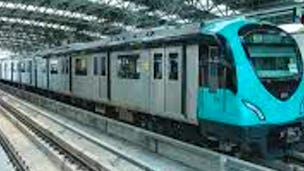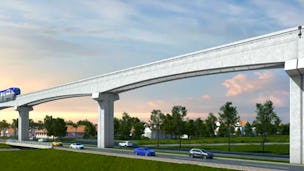This course has been created for Civil and Transportation Engineers. The "Design concepts in Metro Rail systems" course is intended for entry level Engineers, those who want to comprehend and navigate the concepts in design of Metro rail systems. Throughout this course, participants will learn about the fundamental principles of design of Metro Rail systems in five modules. Tailored by industrial experts, this course is for the consumption of entry level Engineers in the Indian Subcontinent.

Design Concepts in Metro Rails
Ends soon: Gain next-level skills with Coursera Plus for $199 (regularly $399). Save now.

Design Concepts in Metro Rails
This course is part of Metro Rail Systems and Construction Specialization

Instructor: Subject Matter Expert
Included with
Recommended experience
What you'll learn
Interpret design recommendations and Codes of Practice for Elevated and Underground Metros.
Design the earth retaining systems for the excavations of underground stations.
Skills you'll gain
Details to know

Add to your LinkedIn profile
5 assignments
See how employees at top companies are mastering in-demand skills

Build your subject-matter expertise
- Learn new concepts from industry experts
- Gain a foundational understanding of a subject or tool
- Develop job-relevant skills with hands-on projects
- Earn a shareable career certificate

There are 5 modules in this course
This module focuses on elevated metro stations, encompassing a detailed examination of station components, loads exerted on the station, modeling, and analysis concepts utilizing software. Learners will gain insights into the intricacies of designing station components, emphasizing practical applications and the utilization of software for effective modeling and analysis in the metro station design process.
What's included
14 videos1 assignment
This module delves into the elements of elevated viaducts, exploring topics such as Indian codes of practice governing metro viaducts, the various loads acting on these structures, and the application of modeling and analysis concepts using software. It further addresses the design intricacies of the superstructure, substructure, and foundations of metro viaducts. Additionally, the module introduces the learners to modeling software specific to metro rails, providing a comprehensive overview of tools essential for effective design and analysis in the field.
What's included
9 videos1 assignment
This module on underground stations- Earth retaining structures encompasses the elements comprising an underground metro station, its configuration and different earth retaining systems used in underground metros. It also includes the design and analysis of diaphragm walls using specialized software.
What's included
14 videos1 assignment
The module focusing on Underground Metro Stations analysis involves the exploration of Indian codes of practice governing the design of metro components and the evaluation of loads impacting underground stations. It also includes outline of the software used in the analysis of underground metro station
What's included
10 videos1 assignment
The module centered on the design of underground stations includes considerations of SOD restrictions and the sizing of elements for underground stations. It encompasses the modeling of underground stations using software and the design of station components in accordance with the relevant code of practice.
What's included
8 videos1 assignment
Earn a career certificate
Add this credential to your LinkedIn profile, resume, or CV. Share it on social media and in your performance review.
Instructor

Offered by
Explore more from Environmental Science and Sustainability

L&T EduTech

L&T EduTech
Why people choose Coursera for their career




Frequently asked questions
To access the course materials, assignments and to earn a Certificate, you will need to purchase the Certificate experience when you enroll in a course. You can try a Free Trial instead, or apply for Financial Aid. The course may offer 'Full Course, No Certificate' instead. This option lets you see all course materials, submit required assessments, and get a final grade. This also means that you will not be able to purchase a Certificate experience.
When you enroll in the course, you get access to all of the courses in the Specialization, and you earn a certificate when you complete the work. Your electronic Certificate will be added to your Accomplishments page - from there, you can print your Certificate or add it to your LinkedIn profile.
Yes. In select learning programs, you can apply for financial aid or a scholarship if you can’t afford the enrollment fee. If fin aid or scholarship is available for your learning program selection, you’ll find a link to apply on the description page.
More questions
Financial aid available,





